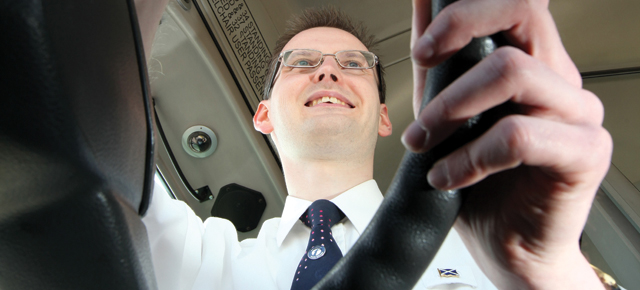The bus industry is short of 4,000 drivers and there are fears this could do untold damage to the future commercial viability of the sector

BY ANDREW GARNETT
There are deepening concerns in the bus industry about the potentially catastrophic effect the growing shortage of bus drivers may have as competition for recruits heats up in the professional driver market.
The Confederation of Passenger Transport estimates there is a national shortage of 4,000 bus drivers, with analysis by Passenger Transport suggesting Scotland, the north east of England, Bristol and the south west were hardest hit this week.
First West of England revealed it was around 70 drivers short at its operations in Bristol and Bath. The situation there has been exacerbated by a number of existing drivers either self isolating or off sick after testing positive for Covid-19.
In a statement, Doug Claringbold, First West of England’s managing director, admitted his company was experiencing reliability issues and suspending some journeys as it grappled with the issue.
We are working harder than ever to recruit and train new drivers, however in common with bus operators across the UK we are experiencing a severe shortage of staff
“We are working harder than ever to recruit and train new drivers, however in common with bus operators across the UK we are experiencing a severe shortage of staff,” he said.
“This situation is exacerbated by a number of other factors, including an increase in staff sickness, up three times normal levels in the West of England, an increase in drivers having to self-isolate due to family members contracting Covid-19 and staff holidays and accrued holidays resulting from long periods of furlough for some staff members.
“On top of this, due to Covid-19 restrictions placed on us earlier in the year, we have been prevented from close contact training with PCV learners, causing a backlog in training. Delays in getting licences back from the Driver and Vehicle Licensing Agency (DVLA) due to industrial action has also had an impact, although we’re pleased to see that this situation is starting to improve considerably.”
Claringbold added the operator was addressing the issues by using agency drivers in order to try to minimise the network impact.
In the north of England, Transdev Blazefield revealed that potential bus driver trainees are currently waiting over three times longer than usual to get their licences and test dates confirmed by the Driver and Vehicle Standards Agency (DVSA). This is leading to delays in recruits moving forward from the classroom to the road.
“Right now, we have 95 new colleagues at The Academy, our in-house driver training facility in Yorkshire and Lancashire,” said chief executive Alex Hornby. “They just want to complete their training and be out on the road serving our customers – but instead, they’re waiting over three times longer than usual to get licences and test dates confirmed from the DVSA.”
He added that his company was backing industry lobbying of the government to speed up the provisional licence applications and free up availability of theory and practical tests. “We are also keen to introduce our own delegated examiner to help process testing, but DVSA training needed to help us introduce these roles remains suspended,” Hornby added.
The problems are not limited to the larger group operators. Bill Hiron, an industry entrepreneur and owner of bus operator Stephensons of Essex, told Passenger Transport this week that his companies were finding it increasingly difficult to recruit and retain staff. He said the problem had started when DVSA suspended driving tests during the Covid lockdowns. Hiron claims these suspensions meant he lost between 30 and 40 new recruits that he would have trained up during the periods when the DVSA suspended all vocational driver testing.
But there are other more fundamental problems too, particularly when it comes to the recruitment and retention of staff.
“There’s a whole combination of reasons [behind what’s happening],” Hiron said. “For the people that are leaving it’s partly reappraisal of lifestyle post-Covid – perhaps that’s the best way to describe it. We’ve had people retiring or going to part time jobs that are less stressful or moving to a rural area where they can chill out a bit more. It’s partly people going to, not just HGV, but places like Amazon, DPD and white van man-type jobs too.”
Hiron added that one of his depots was very close to Stansted Airport and as the aviation sector rebounded following the easing of Covid restrictions, competition in the job market there was hotting up. Companies are wooing would be recruitments with golden handshakes and all manner of bonuses and perks.
That’s increasingly placing a big squeeze on the ability to recruit, he says. At Hiron’s coach operation in Suffolk, which relies solely on recruiting staff with PCV licences, the situation was even worse. “You can’t get licence holders for love nor money,” Hiron said.
But he also believes something fundamental has happened in the job market in recent months.
The worrying thing is that we’re not even getting applications from people who want to train as drivers
Hiron continued: “The big groups have been putting forward there is a big pipeline of people wanting to become drivers, but I’m not sure that’s necessarily true in all cases. Certainly in some areas there are, but the worrying thing is that we’re not even getting applications from people who want to train as drivers.
“We’re getting some applications, but out of four interviews only one turns up and that’s despite us ringing them the day before to check they’re still going to come. Then the following day only one out of the four turns up. Why? I don’t know but there’s something very strange going on in the employment market, literally in the last six weeks. There has been a very discernible shift away from people wanting to do the job.”
Of course these issues are not just restricted to the bus industry. The recruitment woes, particularly in the hospitality, social care and freight sectors are well known.
Many hauliers have offered staff inflation-busting, double-digit pay rises in recent weeks in a bid to keep and recruit staff in order to tackle their own driver shortage issues. Logistics firm Gist, which delivers for Tesco, M&S, Aldi, Morrisons and Ocado, is now reportedly offering annual pay of up to £56,674. Meanwhile, supermarket chain Waitrose is offering annual pay of £53,780 and a £1,000 joining bonus for recruits with HGV licences at some locations.
Hiron increased wages for his drivers at the end of August by just under 6%. He says this stemmed the exodus of staff to some degree, but it had not made any difference to the number of people coming in.
“It worries me,” he said. “If it’s a short term problem there’s an end in sight, but I’m not sure it is. There are all sorts of sectors of the economy which are short of staff. In a sense you can argue that’s always solvable by wages, but I don’t know whether it is or it isn’t. But if it is it’s not solvable by two or three percent, or even, five, six or seven percent. Clearly it is going to take a very seismic shift in wages, whether that be 30%, 40%, 50%, 100%… I don’t know.
“The challenge with that is, in the bus industry, if you put in that level of wage increase the whole economic model of bus operation just disappears. Even with the most commercial and profitable city network, there’s not many services that will withstand that sort of wage increase.” .
DVLA ISSUES ADD TO WOES
The DVLA is understood to have a backlog of more than 56,000 applications for PCV and HGV licences, with 4,000 of them applications for new provisional licences. Delays have been exacerbated by Covid-19 and strike action at DVLA’s Swansea offices.
This article appears in the latest issue of Passenger Transport.
DON’T MISS OUT – GET YOUR COPY! – click here to subscribe!







